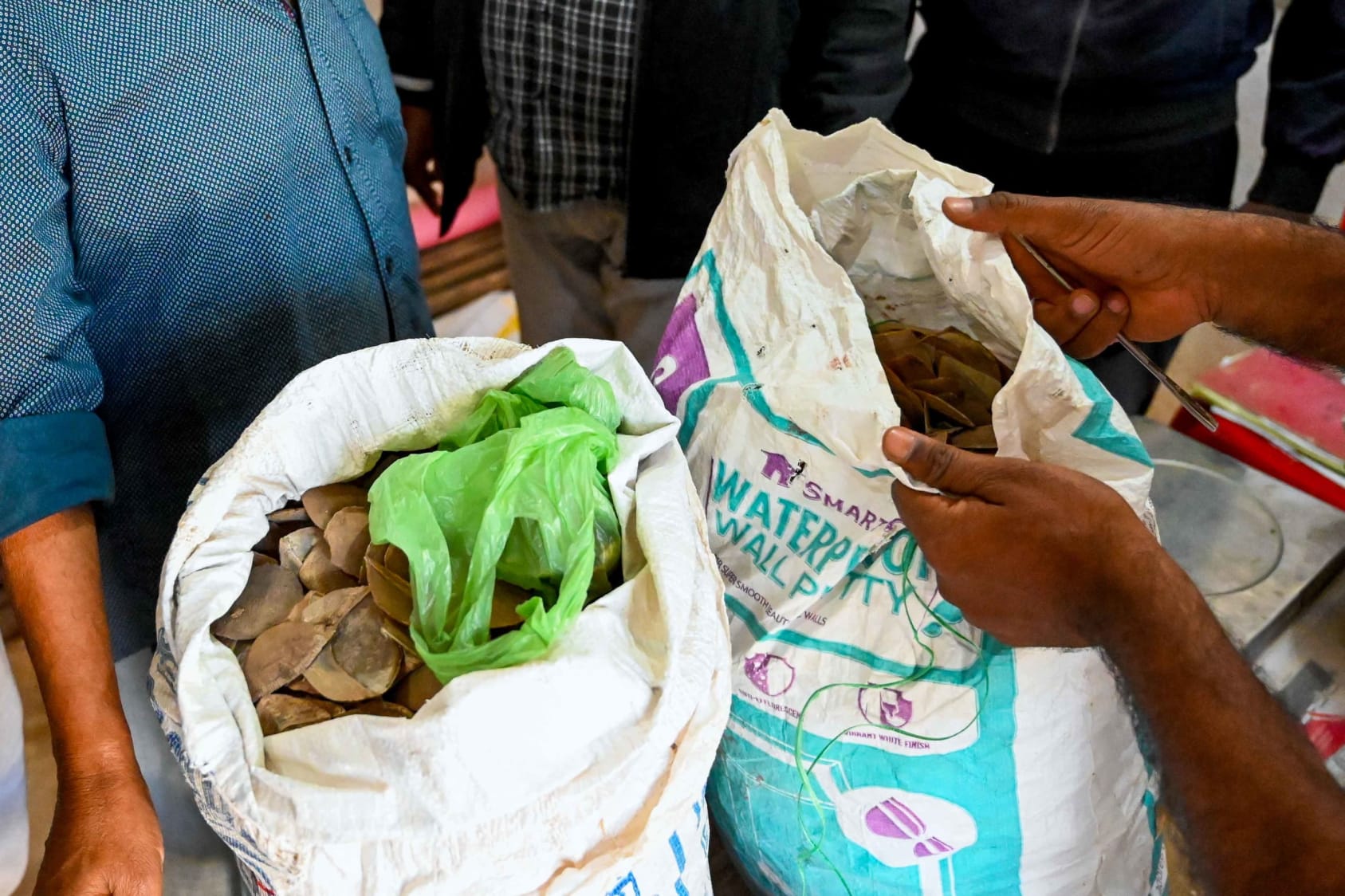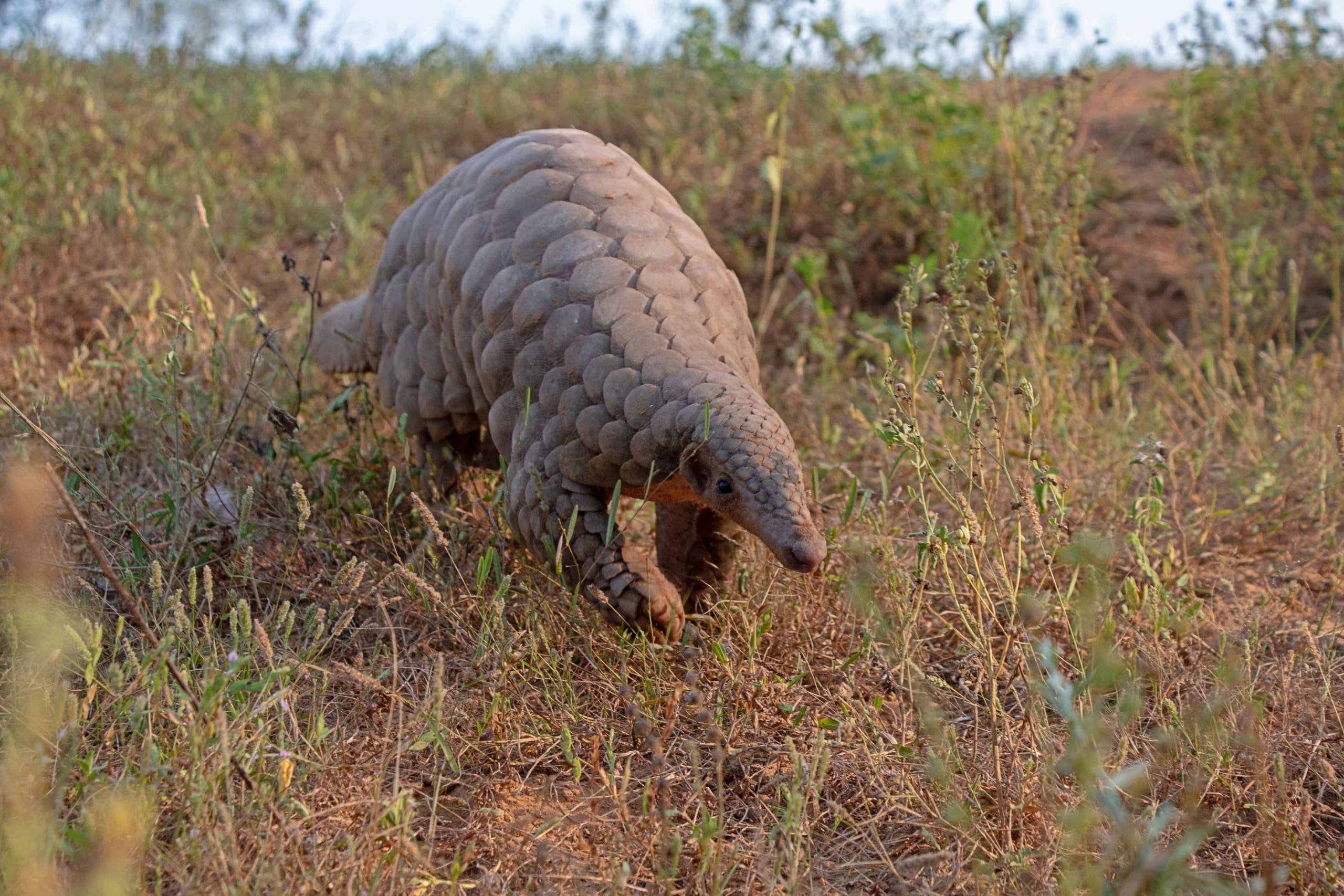 Listen to this article
•
15:34 min
Listen to this article
•
15:34 min
A coarseness took over his voice the moment he picked up the call. Sitting beside me now was a completely different person, one you would more appropriately place in the forbidden lanes of heartland Uttar Pradesh. It was an alias that he had mastered over several years. Sarfaraz, the alias, was in the business of dealing with “traditional wildlife medicine”, supplying it within and beyond the country’s borders. Today, he was setting up a deal in the remote reaches of Chhatisgarh’s Bastar District. As he negotiated the rates, he eagerly awaited being handed over a sack full of Indian pangolin scales by the end of the day.
Pangolin scales have always been in high demand. People believe they possess magical properties that can heal ailments from joint problems to infertility. Sarfaraz also talks about rituals where these scales are an important component of black magic. This is an India where magic and witchcraft are still an essential part of people’s lives and community establishments. “While we have always associated wildlife products such as pangolin scales with Traditional Chinese Medicine, there is a similar market that has long thrived within India’s indigenous communities”, Sarfaraz exclaims. Pangolins are mainly hunted during the warmer seasons and are subjected to the brutal process of being boiled alive to extract their scales. “Most often, the meat becomes a part of the day’s meal for the hunter’s family and is also believed to have medicinal properties,” making it highly coveted locally, adds Sarfaraz.
Even today, in weekly markets in villages like Geedam, in the Bastar district of Chhattisgarh, pangolin scales can be purchased by the kilogramme. Of course, the exchange is discreet and happens under the table. Establishing connections with such sellers requires trust and references — skills that Sarfaraz has honed over several years. The sellers are well aware that they are operating in illegal territory, but they feel the money they make is worth the risk.
A trade of death and deception
Sarfaraz has been tracking illegal wildlife trade markets and traders across India since 2019. During this time, he trained himself to speak their language. “It is very important to be conversant with the traders’ terminology, including their code words. For pangolin scales, it’s ‘plastic chips’. For leopard and tiger skin/pelt, it is a chota (small)/bada (big) teddy, depending on the species. Other commonly used codes for big cat skins include bada/chota chadar (sheet) or even dhabba wala (spotted) and dhari wala (striped) chadar.”
“In this market, buyers and sellers are understandably wary of anyone new they are dealing with. You need to be up to date on the market rates across species and products, trade routes, and common modes of operation”, Sarfaraz adds. Both persuasive and bold, his negotiations have helped enforcement officials apprehend more than 200 wildlife traffickers across the country. For every new case, Sarfaraz weaves a unique backstory for himself to gain the trader’s confidence. “The most difficult and perhaps the most interesting part of the job is sticking to your story. Having so many aliases, it is easy to confuse cases, but this is a skill you must hone to ensure the success of the operation”, he says. For this case, Sarfaraz posed as an exporter who had taken over the family business after his father’s long-lost battle with cancer. The person on the other end of the phone had recently experienced similar losses in his family — something Sarfaraz had learnt over the dozen calls in the past month and wanted to work in his favour.
In local markets like Geedam, a kilogramme of pangolin scales will make enough money to buy a new low-end smartphone. In an operation in late 2024, Sarfaraz managed to apprehend an individual who had been collecting these scales over the years as an investment. The individual was promised double the going rate for about 32 kilogrammes of scales he had. “If the deal goes well, I can certainly connect you to more of my contacts who deal in these items”, the trader had promised. A week-long getting-to-know and trust-building finally resulted in a joint raid by the State Forest Department, the State Flying Squad, and Wildlife Trust of India, a wildlife conservation action institution that has been working to dismantle illegal wildlife trade through intelligence gathering (where Sarfaraz is a member).
Giving in to greed
Sarfaraz conveyed a sense of urgency over the phone regarding the delivery of the goods. On the other end was a poacher with whom he has been communicating with for some time now. He had developed the lead from a phone number divulged by another perpetrator during a previous operation. “This is a strong network of illegal wildlife traffickers that we are dealing with”, Sarfaraz explains in between the calls. He has to be patient enough not to raise suspicion but vigilant enough to catch them with the contraband in their possession. Even if the person doesn’t have the product, they will tap into the network to set up a deal and earn a commission. A few phone calls and introducing his friends to Sarfaraz would make him a substantial sum in a single evening, probably enough to cover groceries for a family of six in this area. That would be a considerable amount in this “off-season”. Establishing a sense of urgency also ensures that another pangolin is not hunted from the wild to cater to the deal. Giving in to greed, the poacher on the phone has agreed to bring together four associates, all local villagers and seasoned hunters, offering 12 kilogrammes of scales.

“A lot of things can go wrong during such operations. It’s one thing to set up the deal and an entirely different exercise to be able to apprehend the perpetrators in their own territory”, he says. We were travelling with three other members of the State Flying Squad, a team trained specifically to handle such operations. This team forms the frontline of the state’s enforcement operations and, in recent years, has been able to recover a range of wildlife products, ranging from tiger skin to live pangolins, meant for slaughter. We made a pit stop at the District Range Office to rope in more manpower. A WhatsApp group was created, and members were divided into pairs, dressed in civilian clothes and riding worn-out two-wheelers to blend in. The lead team had Sarfaraz posing as the buyer, his driver, and an associate, who has been known to jump into such high-stakes situations fearlessly. Sarfaraz had managed to set up the deal as close to the motorable road as possible. This was important to apprehend any culprits who might try to flee. It was equally important that we disperse from the area as soon as the deed was done, before the word spread. “If the mob comes into play, everything will be lost. We might not even return whole”, Sarfaraz says. “This is an area notorious for left-wing extremism, and teams such as ours aren’t exactly welcomed for any kind of intervention,” he adds. There have also been cases when Sarfaraz had barely managed to return alive from operations that went south. But that’s part of the job.
Catching poachers
The sun was already dipping below the horizon as we travelled through the single-lane road into Mandur Village. The buyer’s car had already driven ahead, and I was part of the first team trailing behind, maintaining a distance of 100 metres. The landscape was barren, and both sides of the road were dotted with the stumps of freshly cut paddy. According to plan, the team had positioned themselves — some acting as tourists taking photographs of the sunset, while others pretended to refuel their motorbikes. Not far away, the famous Chitrakoot Waterfalls tumbled down, which would serve as our gateway if we were to be questioned. In the distance, we could see Sarfaraz’s car gleaming under the fading golden sunlight. Everyone was alert and ready to strike at a moment’s notice.
Twenty minutes into our position on the road, I noticed a couple of motorbikes taking the dirt road towards Sarfaraz. Among the first things to ensure in such operations is to verify the contraband. Once the lead team had dropped the much-awaited code word in the group, the fairly silent evening erupted into instant chaos. Within seconds, I saw Sarfaraz had already grabbed one of the offenders while his associate had been able to secure another on the ground. As expected, two more offenders attempted to escape, but the escort team lay in wait. Amidst the chaos, one of the offenders, carrying the sack of pangolin scales, flung it over dense lantana hedges. Owing to the sudden darkness that had taken over the evening, it took the search team a few minutes to locate the contraband. The operation resulted in the apprehension of four pangolin traffickers, 12 kilogrammes of pangolin scales, two vehicles and a knowledge bank of the local illegal network, which would be tapped into during the interrogations that followed. The offenders were quickly loaded into the forest department’s vehicle, and we headed for the safety of the Range Office before the locals caught wind of what had transpired and gathered in numbers.
It takes teamwork, but the battle is far from over
Back at the office, senior officers from the Forest Department and the State Flying Squad ensured that the initial interrogation generated more leads. The day’s operation was, after all, merely a dent in the vast network of wildlife traffickers spread across the country and beyond. Most of the time, the accused are set free due to a lack of evidence or the absence of strong case documentation. To counter such situations, Sarfaraz and his team at WTI also conduct regular training with forest departments and enforcement agencies across the country. “While India has one of the most stringent laws against wildlife crimes, most operations turn futile due to the lack of technical expertise in building strong cases,” says Debobroto Sircar, the head of the Wildlife Crime Control Division at WTI. Within days, poachers are back in business with heightened caution. WTI also works with wildlife lawyers who help ensure proper case documentation and registrations to enable favourable judgements.
The evening quickly turned into night, and it was incredible to witness the dedication of every member. While this was not the first such operation the team was involved in, they were fully committed to it. “There is a high risk in this job, and things get ugly more often than one can imagine. What keeps us going is the drive to bring such individuals to justice and ensure that our country’s wildlife has one less hunter trailing them”, Sarfaraz adds. The villagers arrested that evening were certainly at the bottom of the illegal wildlife trade network but also the first links in the supply chain. To stop wildlife trade, the demand must stop, but at the same time, enforcement operations like this play a critical role in containing the supply side.
“I am yet to see a pangolin in the wild, in its natural habitat, doing what it is supposed to do”, Sarfaraz laments. With a pangolin poached from the wild every third minute across the globe, this is definitely a benchmark that every conservationist aspires to.








